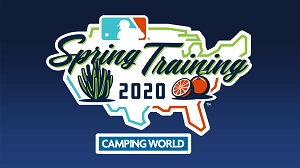Blue Jays connect through diverse clubhouse
DUNEDIN, Fla. -- Movies were what helped Teoscar Hernández the most.
Netflix changed Phillippe Aumont’s life.
Country music, especially songs from American country and Southern rock band Alabama, was the biggest difference-maker for Wilmer Font.
When Hernández made his way from the Dominican Republic to the United States, signed by the Astros as a free agent at 18 years old, he spoke only Spanish. At the same age, Aumont was drafted by the Seattle Mariners in the first round, the Canadian from Gatineau, Quebec, speaking just French. Font joined the Rangers' organization as a 16-year-old from Venezuela, never having needed English before.
They are among the 19 players and coaches in Blue Jays camp who were born outside of the U.S.
“Not only do we get to learn about the different individual personalities, but also different backgrounds and cultures everyone grew up in,” Korean left-hander Hyun Jin Ryu said. “I don’t think there are many workplaces out there as diverse as our clubhouse.”
In total, 11 countries and territories are represented in the Dunedin clubhouse this spring. Those include the U.S. (57 players and coaches), the Dominican Republic (seven), Canada (three), Puerto Rico (two), and one representative each from Korea, Japan, Venezuela, Cuba, Mexico, Panama and Nicaragua.
Though many of these players are now bilingual, the club still employs three interpreters, for whom manager Charlie Montoyo joked, “We need a bigger plane.”
For some, like Hernández and Font, they learned a new language through English classes offered in other organizations. But outside influences also made a big impact.
“Still to this day, I cannot watch a movie without the subtitles,” Aumont said. “I don’t like going to movies anymore because they don’t have subtitles. I would watch the movies in English, subtitles in English. There are a lot of words and sounds you don’t hear in a movie because you’re so caught up in the picture, but with the translation at the bottom, I know what’s going on.”
This spring, Hernández has asked each of his teammates for two songs apiece, so that he can make a playlist representative of everyone on the team – though he admitted, “I’ve got like six of my songs on there.”
“It’s good because there’s a lot of different energy from different countries,” Hernández said. “It’s going to help us stick together, because we have that energy from every country pulling us all together.”
Lourdes Gurriel Jr. is excited to share the greetings he’s learned in Japanese, Korean and Chinese, to go along with the Spanish and English phrases the Cuban native already knows so well.
Blue Jays prospect Alejandro Kirk (Mexico) and newcomer Shun Yamaguchi (Japan) have each won over teammates with food from their countries. During his time with Class A Advanced Dunedin last season, Kirk shared tacos and enchiladas from an authentic restaurant in Clearwater, Fla. This spring, Yamaguchi followed suit.
“I had a chance to bring some Japanese snacks around,” Yamaguchi said through interpreter Yuto Sakurai. “They’re equivalent to a cheese ball in the States. I gave them out to a couple of guys, and they really liked them.”
And while all of Ryu’s English words come by way of the club’s Korean interpreter Bryan Lee, general manager Ross Atkins believes that the southpaw’s presence is enough to break down language barriers.
“It doesn’t seem like he doesn’t command the language, because he already has established relationships and rapport in a very natural way,” Atkins said. “He is very well received. He reminds me a lot of Vladdy [Guerrero Jr.]. Every time I see him, he puts a smile on my face. I can’t wait to be around him, engage, and it’s because he’s comfortable in this environment, and that’s big for us.”
Perhaps it’s beneficial that Montoyo (Puerto Rico) and two of his coaches -- third-base coach Luis Rivera (Puerto Rico) and hitting coach Guillermo Martinez (Nicaragua) -- grew up outside the U.S.
Others with unique backgrounds include Rubén Tejada (Panama), Sean Reid-Foley (born in Guam when his father was in the Coast Guard) and Joshua Palacios, whose mother was born in Curaçao.
“It shows what kind of organization this is to start with -- that they want to diversify, and they’re not afraid to go out there and get players,” Aumont said. “International scouting is something they clearly think is important, and it is. There are a lot of good players out there.”
Some of the team’s American-born players can relate to this process of cultural assimilation.
Anthony Bass, who played in the Japan Pacific League in 2016, remembers what an adventure it was the first time he ventured into a grocery store in Hokkaido.
“It took me three hours to get 10 items because I had no idea where they were located -- first and foremost -- and because their packaging is different,” he said. “What helped me in Japan was watching some of their local cartoon shows, because it’s a lot of basic terms and basic language.”
During his time playing in the Korean Baseball Organization, Andy Burns quickly realized that he was going to have to pick up some of the local language if he didn’t want to pay his interpreter to eat every meal with him. It was also there that, in his seventh year of professional baseball, he learned how to smile.
“They can only go off your facial expressions a lot of times,” the infielder said.
In a similar way, the Blue Jays are learning how to help each other feel at home.
“It feels good to have guys from pretty much all parts of the world in the clubhouse,” Gurriel said through Spanish interpreter Hector Lebron. “The chemistry is very good right now. We try to talk to each other and learn words from all the other guys, and it’s really fun to be around.”
